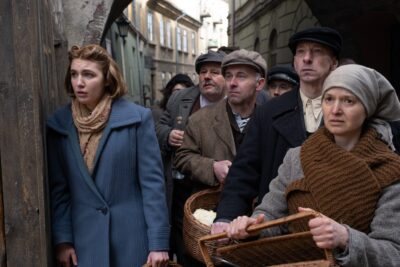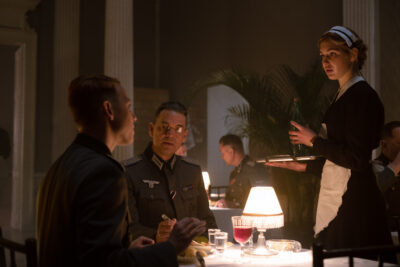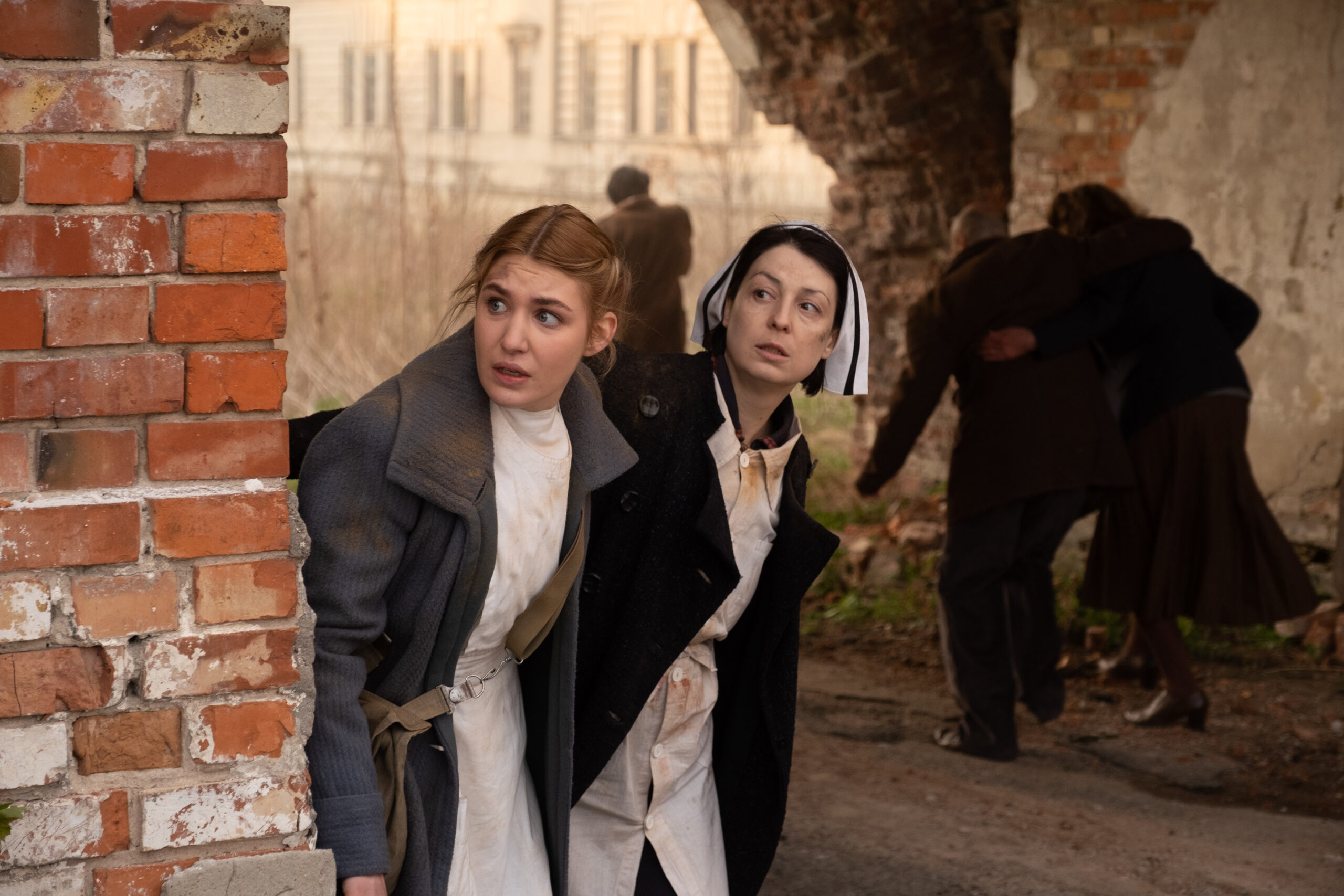In 1939 Poland, a young nurse hides 12 Jewish workers in the only place she can think of: the basement of a Nazi officer’s house. Irena’s Vow tells the remarkable true story of Irena Gut Opdyke, starring Yellowjackets actress Sophie Nélisse.
Over two years, Irena and her friends narrowly avoid being discovered. The film will leave you on edge as the group faces many challenges—Nazis enjoy lavish parties upstairs, the group receives a threatening blackmail letter, and one of the Jewish couples has a baby while in hiding. Amidst constant fear are brief moments of joy and genuine connection, as the 12 form an unbreakable bond with Irena, and each other.
Based on Dan Gordon’s 2009 off-Broadway play of the same name, and directed by Louise Archambault, Irena’s Vow is an inspiring story of the triumphs of the human spirit amidst the gut-wrenching horrors of the Holocaust.
Nélisse plays Irena with a quiet strength and courage. We asked her about preparing for the role, meeting Irena’s daughter, and the importance of strong-willed female characters.
What were your first impressions when you heard Irena’s story?
After reading the script I was like, oh, so much of this must have been embellished for filmmaking because there’s no way she’s accomplished all of this. And then when I heard that everything was true, all I could think about was how strong and resilient and brave she must have been.
How did you prepare to play Irena?
I felt a lot of pressure to live up to the life that she led and give an accurate representation of the woman that she was. That came with doing research and knowing more about her than what you see on paper in the script. There’s a book about her life, so I read that and I spoke with Dan Gordon who wrote the script and who’s a good friend of hers. I found some archives on the internet, pictures of her in her 20s and also interviews that she’d given later on in her life and worked with a dialect coach to do the Polish accent.

Irena was living in constant fear, with very few moments to react to the horrors happening around her. Was it a challenge to play a character that had to hold so much inside?
Definitely. You don’t want the performance to be flat and one-noted because she is always in that same realm of emotions. You want the audience to understand what’s going on in her mind without being able to communicate it, otherwise, she’d be caught. Louise and I sat down and went through all the scenes and tried to find glimpses where you could see her just a little bit more at ease and finding these moments of light and joy, when you see her with the Jewish people in the cellar. Moments of love and of compassion. It was important for us to sprinkle those in to bring a bit of levity to the script.
Quite a few of your characters find themselves in survival situations, having to find the humanity in extreme circumstances- what draws you to these kinds of roles?
It’s important to find the humanity within every character because that’s how, as an audience, you can connect to a character. Whatever emotion it is, if it’s only black or white and the character is not layered and is not structured properly, you don’t feel connected to them, and they feel out of touch and unreal. I try to find characters that feel like they have a voice and that are layered and complex. Because that’s who we are as humans, we’re not just black and white. If we feel fear, it’s because of something and if we feel love, it’s because of something and all of our emotion stems from somewhere. Otherwise you don’t feel any compassion for the characters. That’s what I want to look for when taking on a role.
We love that Irena’s Vow is centring a woman’s story, as women can often be overlooked when it comes to retelling history. Was that something you considered in this role?
A lot of stories about women are very, one-sided or stereotypical, or written by men and how men perceive women. We’re not used to seeing women that are so strong and resilient and have absolutely changed the world. I feel a responsibility when taking on a role, that it’s a strong female role that shows all facets of what it is to be a woman and how strong and wise we can be. For me, it’s very inspiring, and I hope that it will be for younger women of my generation as well.

What are some memorable responses to the film you’ve seen so far?
The moment that touched me the most was when Jeannie Smith, Irena’s daughter, saw it, and she said that she could see so much of her mother in me, which is the biggest compliment one could ever receive. I spoke also with Roman Haller, who is the boy that one of the Jewish couples had in hiding. To meet him is so surreal and to have him like the movie and have him be proud that we’re spreading part of his life’s story—it was very touching.
Irena’s Vow was shot in Poland, where the story is set. Did that have an impact on your mindset while filming?
We were shooting in Poland, but we were also shooting on the border of Ukraine while the war was going on. To feel the ramifications of the war, every day, whether it’s waking up, and there’s soldiers that are at our hotel, or refugees. It was a constant reminder of why we had to do that movie. Being on set every day, surrounded by the machinery and the swastika flags and the costumes, it was so easy for me to tap into into the character and get an idea of what she must have felt like back then. As hard and emotional as it was, every day just felt very special. And I feel very honoured to be a part of the project.
With the world we’re living in today, what is the impact of the film coming out now?
It’s a movie that’s still so relevant because there’s ongoing wars everywhere. And clearly, we seem not to be learning from our mistakes. This movie shows, in my mind, that we have to see beyond our differences. As cliche as it sounds, I think our differences are what makes us beautiful as a society and I think it’s so sad that it’s created so much conflict. Irena is the perfect example of seeing beyond our differences and instead trying to be more compassionate and less judgmental. I think if we were to be all a little bit more like her, we would live in a much more peaceful society.
Irena’s Vow is in theatres now.




 Follow Us On Instagram
Follow Us On Instagram
